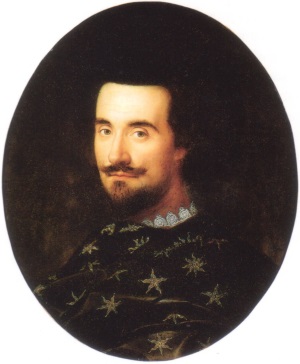Lord Herbert of Cherbury 1583-1648

Edward Herbert was born in Shropshire, one of nine children of Richard Herbert of Montgomery Castle and an elder brother of the devotional poet George Herbert. He was educated privately and at University College, Oxford, matriculating in 1596. In 1599 he married his cousin Mary, heiress of Sir William Herbert and returned to Oxford to continue his studies. On the accession of King James I to the throne, he became a member of the court and was knighted in 1603.
In 1608 he went to France and for the next ten years he spent most of his time on the continent, some of it as a soldier of fortune fighting for Prince Nassau in the Netherlands. In 1619 he was made ambassador to Paris but was recalled after quarrelling with Charles de Luynes, one of the French king’s ministers. He was reinstated in 1622 after the death of de Luynes and was instrumental in arranging the marriage between the future King Charles I and Henrietta Maria. He returned to England in 1624 and was made Baron Cherbury in 1629 for his political services. During the English Civil War his loyalties were divided between the King and Parliament but he ultimately saved his property and received a pension after aligning himself with Parliament. He died in London in 1648.
His prose writing was historical, autobiographical and philosophical, his most important work being his philosophical treatise De Veritate (1624). His poems, published by his son in 1665, had a metaphysical flavour and include sonnets, odes, and eulogies. He was also an accomplished lute player and his Lute Book is one of the most important anthologies of 17th Century lute music.
Works include
Books you might enjoy
Buy books related to Lord Herbert of Cherbury at amazon.co.uk
Support this site
Please help us to improve this site by supporting the site on Patreon. As a supporter you will get access to the English Verse Discord server, where you can meet other poetry enthusiasts and help shape the development of the site.